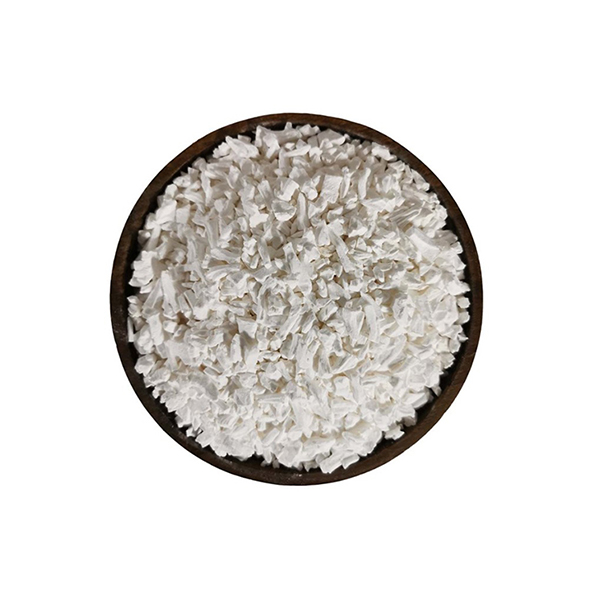Introduction to Natural Wheat Starch and Its Applications
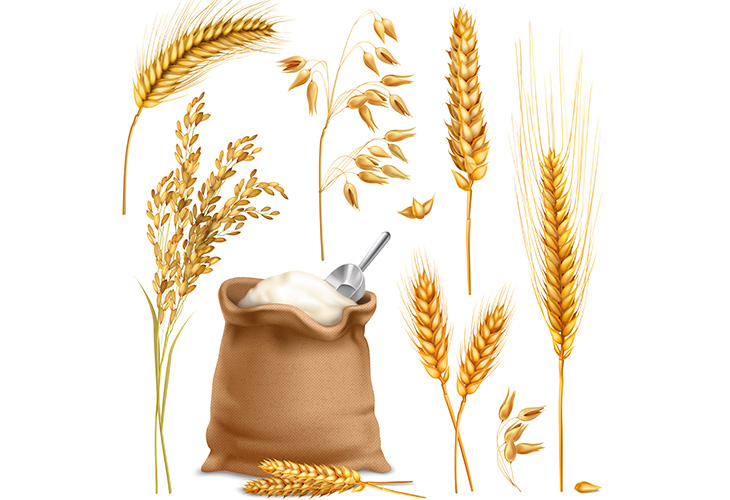
Starch is a plant polysaccharide stored in the roots, buds, and seeds of plants as an energy. Polysaccharides are large molecules made up of repeating sugar units. If these sugar units are all of the same type, they are called homopolysaccharides. Starch is one of the most important homopolysaccharides, primarily found in the endosperm of seeds.
Starch can be hydrolyzed into glucose, providing necessary energy for the body. Glucose is essential for the brain and central nervous system, and its consumption in the diet produces four calories per gram. Starch granules consist of long-chain polymers of glucose molecules that are insoluble in water. Unlike salt and sugar, starch does not form a true solution but creates a temporary suspension when stirred in water.
Raw and uncooked starch granules slowly absorb water and swell. This swelling is crucial during cooking, making starch an excellent thickening agent. Starch not only provides energy but also has unique properties valuable in cooking and the food industry.
Benefits of Using Natural Wheat Starch
Natural wheat starch has numerous health and nutritional benefits, including:
- Source of complex carbohydrates and fiber
- Low glycemic index
- Aids digestion
- Boosts the immune system
- Anti-inflammatory properties
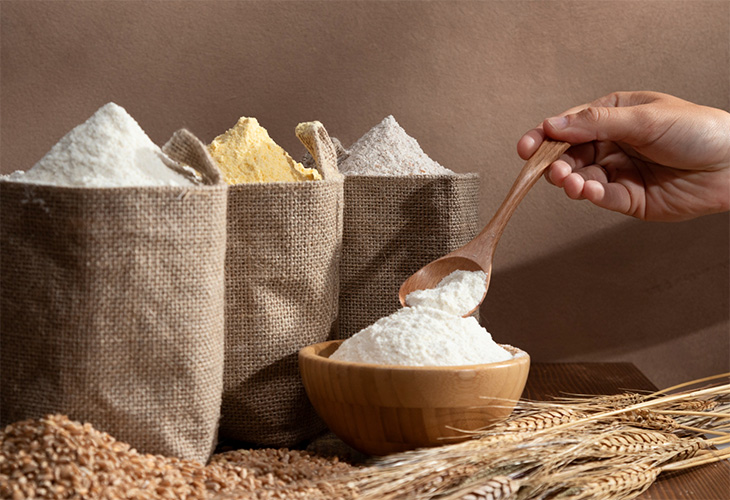
Technical Specifications of the Product Analysis
| Feature | Amount |
|---|---|
| Color | White |
| Solubility | Insoluble in cold water and organic solvents |
| Residue on sieve No. 100 | 12%> |
| Moisture | 8-12% |
| Ash content in dry matter | 0/3% |
| PH | 4/5-7 |
| Acidity | 2-3 |
| Protein in dry matter | 0/8%> |
| Test Name | Limit | Test Results | Standard Number |
|---|---|---|---|
| Moisture | Max 10 | 7-9.8 | 2705 |
| Protein | Min 13 | 13-18 | 19052 |
| Total Ash | Max 6.2 | 2-6 | 2706 |
| Insoluble Ash | Max 0.2 | 0.1 | 37 |
| Feature | Acceptable Limits | Test Method |
|---|---|---|
| Moisture (g/100) | Max 14% | 4797 |
| Total Ash (dry weight basis) | Max 0.23% | 4726 |
| Ash insoluble in acid, weight percent based on dry matter | Max 0.05% | 3278 |
| pH of 10% solution | 4.5-7 | 4727 |
| Acidity (for 10g starch) | Max 3 | 4727 |
| Protein with conversion factor (7.5) (dry weight basis) | Max 0.5% | 4728 |
| Fat (g/100) (dry weight basis) | Max 0.2% | 4798 |
| Residue on sieve No. 100 (14.6 micron pore size) | Max 15% | 381-1 |
| Foreign Materials | Negative | 381-1 |
| Arsenic | Max 1ppm | 4926 |
| Lead | Max 0.2ppm | 5427 |
| Cadmium | Max 0.2ppm | 5836 |
| Total Microorganisms (per gram) | 10000 | 5272 |
| Bacillus Cereus (per gram) | 1000 | 2324 |
| Yeast and Mold (per gram) | 7 × 102 | 10899-1 and (977) |
| Coliform (per gram) | Max 50 | 9263 |
| Sulfite-Reducing Clostridia (per gram) | Max 10 | 2197 and (437) |
| Escherichia Coli (per gram) | Negative | 2946 |
| Total Thermophilic Bacterial Spores in 10g | 125 in 10g | 2843 |
| Total Spores of Non-Gas Producing Bacteria in 10g | 50 pieces per gram | 2843 |
| Counting total spores of anaerobic thermophilic bacteria in 10g | Less than 10 | 2843 |
| Aflatoxin B1 | Max 5 | 6827 |
| Total Aflatoxins | Max 15 | 6827 |
| Ochratoxin A | Max 5 | 9238 |
| Deoxynivalenol | Max 1000 | 9240 |
| Zearalenone | Max 200 | 9239 |
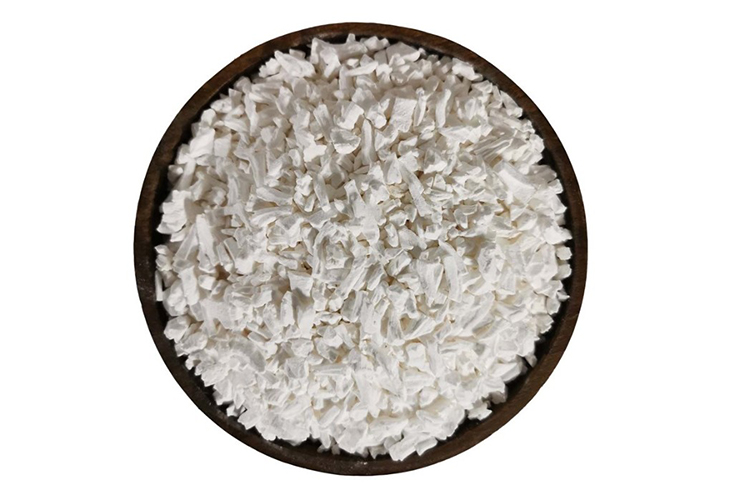
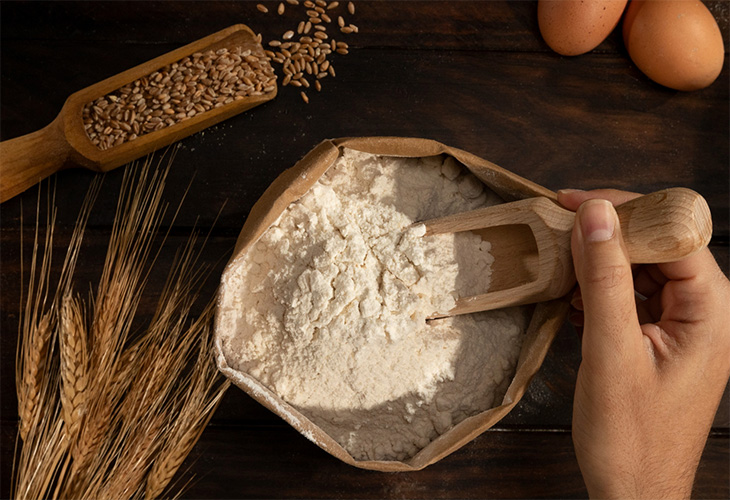
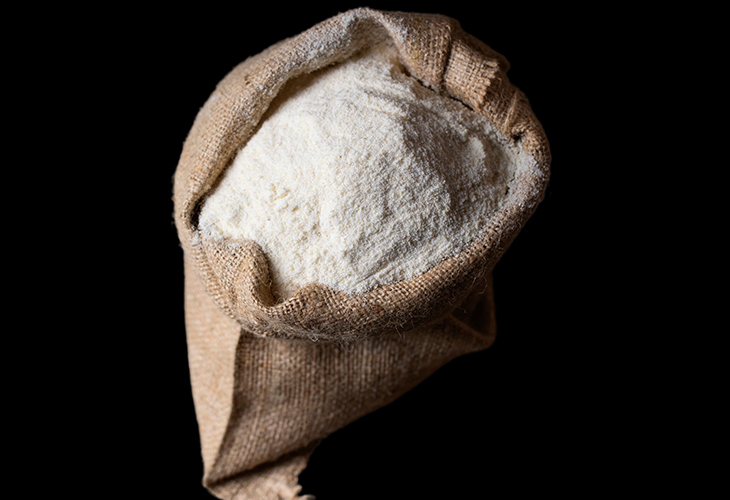
Usage Instructions for Natural Wheat Starch
Natural wheat starch is a valuable raw material used in both food and non-food industries, suitable for various applications. Some diverse uses of natural wheat starch are:
- Production of Sugar Products: Starch is the main ingredient in producing dextrose, dextrin, liquid glucose, and syrups.
- Faludeh: Main ingredient in making Faludeh, a popular Iranian dessert.
- Colloidal Systems: Stabilizing and thickening colloidal systems in food products.
- Bakery Powders: Filler in bakery powders and baking improvers.
- Sauces: maintaining oil and vinegar emulsion and preventing two phases.
- Biscuits and Crackers: Improving texture and crispiness and helping control PH.
- Baking Industries: Preventing dough from sticking to molds before shaping.
- Soups: Thickening agent in various soups.
Other Applications of Starch in Productions
Natural wheat starch is used in various industries, including:
- Confectionery, meat products, pasta, and bread: Improving texture and quality.
- Paper, carton, and packaging: Used in paper and carton production.
- Sugar syrups: Producing various sugar syrups like glucose, dextrose, and fructose.
- Molds: Shaping food and industrial products.
- Disposable Containers and Petrochemicals: Used in producing disposable containers and petrochemical products.
- Pharmaceutical Industries: Filler in drug and glucose serum production.
- Sculpture and Decorative Clay: Producing sculpture and decorative clay dough.
- Animal Feed: Improving the quality of animal, poultry, and fish feed.
- Alcohol and Printing Ink: Producing alcohol and printing ink for paper and fabric.
- Textile Industry: Production of sizing agents for use in the textile, machine-made carpet, and tufted carpet industries.
Natural wheat starch, with its diverse applications, plays a crucial role as a versatile raw material in many industries and helps improve product quality. By choosing natural wheat starch, you can enjoy its superior quality and positive impacts on your products.
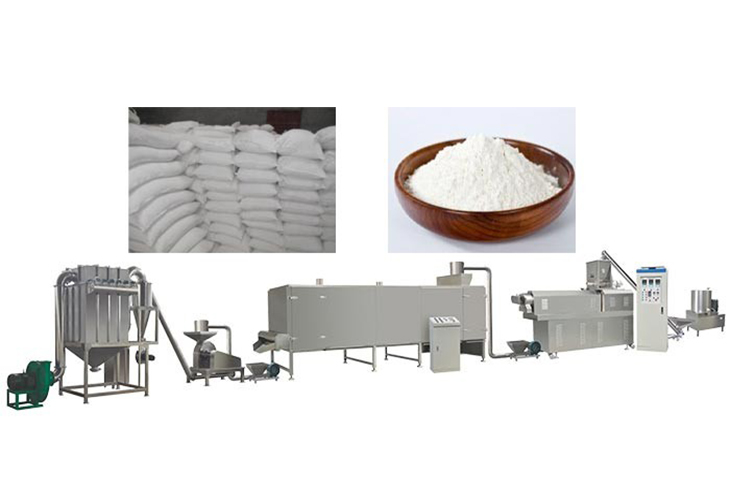
Processing of Natural Wheat Starch
A brief explanation of the production process of natural wheat starch:
Natural wheat starch is extracted from wheat grains. The grains are milled and mixed with water to separate the starch from other materials. Then, the starch is purified and dried to form a fine white powder.
This process includes the following steps:
- Milling the wheat grains
- Soaking and mixing with water
- Separating starch from other materials
- Purifying and drying
Important Tips for Use
Tips and tricks for optimal use of natural wheat starch:
- For making sauces and soups, mix the starch with a little cold water before adding it to the sauce or soup to achieve the desired thickness.
- For baking, gradually add starch to dry ingredients and mix well.
- In the food industry, starch is used as a thickening agent, binder, and filler in various food products.
Proper Storage
Instructions for maintaining the quality and longevity of natural wheat starch:
- Store starch in a cool, dry place.
- Use durable, moisture-resistant packaging.
- Keep away from direct sunlight.
Benefits of Producing Starch in Ragiran
- Use of high-quality raw materials.
- Sustainable production process.
- Commitment to food safety and health: Hygiene maintained at all stages of production.
- Production and packaging according to international standards: Adherence to international standards in product production and packaging.
- Offering products with your required packaging.
- Excellent customer service.
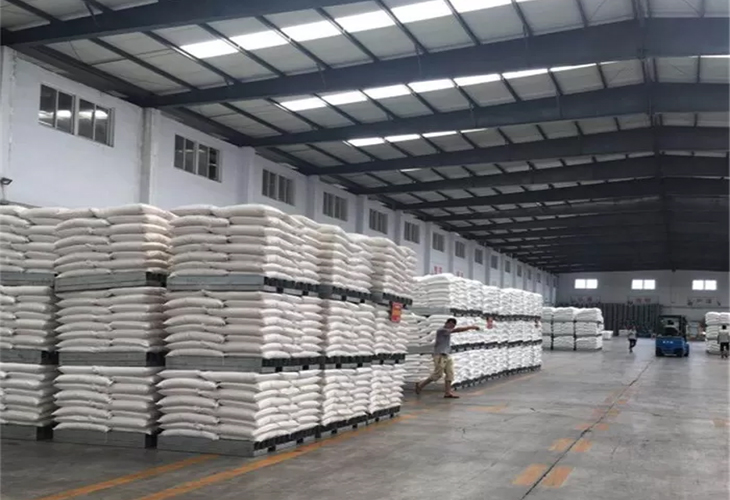
Standards and permits








Transportation Methods
Various transportation methods for shipping plums include air, sea, and land transport, which are chosen based on customer needs and destinations.
Sample products can be provided before bulk orders
For the most accurate pricing information about Wheat Starch, please contact the sales consultants at Ragiran.



